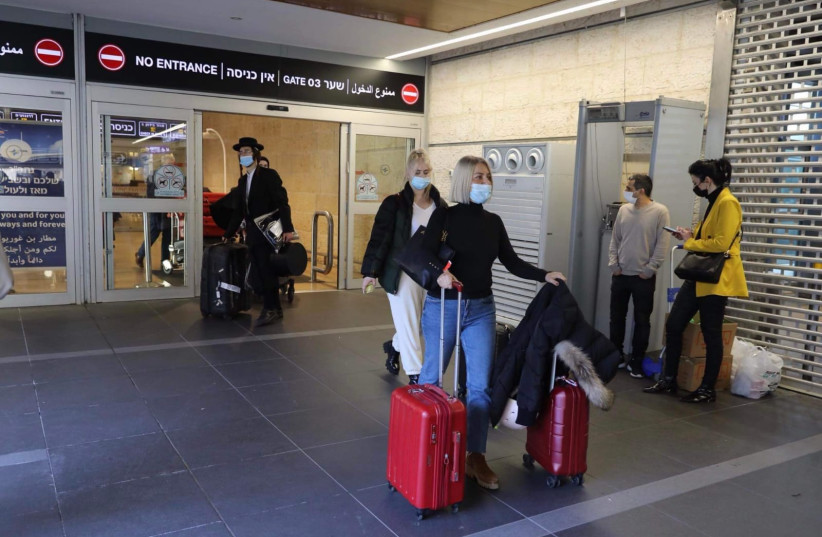A fundraising campaign, food warehouses and satellite phones are part of efforts made by local Jewish organizations in Ukraine due to fear of a Russian invasion. The Federation of Jewish Communities in Ukraine, an organization affiliated with Chabad, has been working tirelessly to purchase dry foods that will be stored in case of emergency.
One of the Federation's senior managers said he has purchased dozens of satellite phones that will be used in case of an invasion.
“As we saw a few months ago during the unrest in Kazakhstan, the Internet and communication systems were all taken down,” he told The Jerusalem Post in a phone interview. “The Russians are so powerful, it’s safe to assume that they may sabotage the Ukrainian communication systems. Therefore, we have sent tens of communities the most updated satellite phones and are working on buying more in order to make sure all communities in Ukraine will be able to communicate with each other and with us in a time of need.”
“While all Jewish organizations are fleeing Ukraine, our rabbis are all in place and are here to stay,” the senior official in the Jewish Federation said, adding that the organization’s warehouses are filled with rice, buckwheat, canned foods, portable lanterns and batteries.
Chabad has about 150 shluchim (emissaries) families in Ukraine, not including local Jews who affiliate with the hassidic sect. When asked who is funding these efforts, the source mentioned the International Fellowship of Christians and Jews, adding that “they were the first to offer assistance.”

The Tikva Jewish orphanage in Odessa, Ukraine, has been under pressure in recent days since two of its leading teachers are emissaries who have been instructed to leave immediately. Four Sherut Leumi (National Service) volunteers have also been asked to leave the country.
Tikva’s founder, Rabbi Shlomo Baksht, told the Post he was very worried.
“Our teachers were instructed to leave Ukraine on Saturday,” he said. “We can manage the departure of the young volunteers back to Israel, but having these teachers leave abruptly during this difficult time can cause major harm to our 300 children. The teachers are morally and psychologically connected to the orphanages. If they abandon them at this difficult time, it will be devastating and will take time and resources to again achieve the orphans’ trust.”
BAKSHT SAID the teachers have asked to stay, but the Israeli Education Ministry is against the idea.
“They’ve asked me to assist them,” he said. “They’re even willing to give up their affiliation with the Education Ministry, but they were told this can backfire at them when they return to Israel. In the past, when teachers left immediately, it caused abandonment issues that we had to deal with at length with a psychologist.
Rabbi Yaakov Bleich, the chief rabbi of Kyiv and Ukraine, told the Post he was disappointed with the Israeli government.
“The State of Israel does nothing for the local Jewish communities in the Ukraine unless they are considering making aliyah,” he said. “The Israeli government cares mainly about its citizens, and that’s a shame.”
“I asked Israeli officials who spoke to us: ‘What about security?’” Bleich said. “After all, the most important thing now is to increase the confidence in the local communities that there will be no provocations against Jews, as the Russians know how to do.”
“Secondly, communities need food aid for a few weeks,” he said. “We need to store food for our nursing homes, orphanages, communities, yeshivas, boarding schools and others. The Diaspora Ministry said perhaps they will be able to convince the Prime Minister’s Office to help us out.”
The Jewish communities in Ukraine are launching a fundraising campaign, Bleich said.
“We are in touch with the Chabad Federation and other communities in order to coordinate positions on what we are fundraising,” he said.
How are the Jews in Ukraine feeling during these difficult times?
Asked how the Jews in Ukraine feel during these difficult times, Bleich said: “Pretty much everything is as usual. The Israelis forced all the emissaries to leave, but there were those who did not want to leave. Unfortunately, they were threatened and shouted at by their superiors in Israel from the Ministry of Education. The emissaries wanted to stay, and the Ministry of Education did not allow them to stay.”
The Jewish Agency for Israel on Saturday said it would evacuate educational shlichim (emissaries) and their families serving in Ukraine in coordination with the Education Ministry. They were previously serving as part of the Education Ministry’s Heftziba program, which seeks to build Jewish and Zionist identity in the former Soviet Union. Most emissaries left for Israel on Sunday.
Bleich said he was not optimistic regarding Israel’s support for Jewish communities in Ukraine.
“The Ukrainian Jewish communities will have to learn a lesson from the way the Israeli government has been handling the support for our situation,” he said. “The behavior is very inappropriate, I would say. If they say they have a responsibility for the communities in the Diaspora, I would like to see not only statements but also acts.”
“We will strengthen in prayer, confidence, faith, and God will help,” Bleich said. “With that, we are making our own plans. If we need to go forward with an evacuation, we will find a way to do it.”
